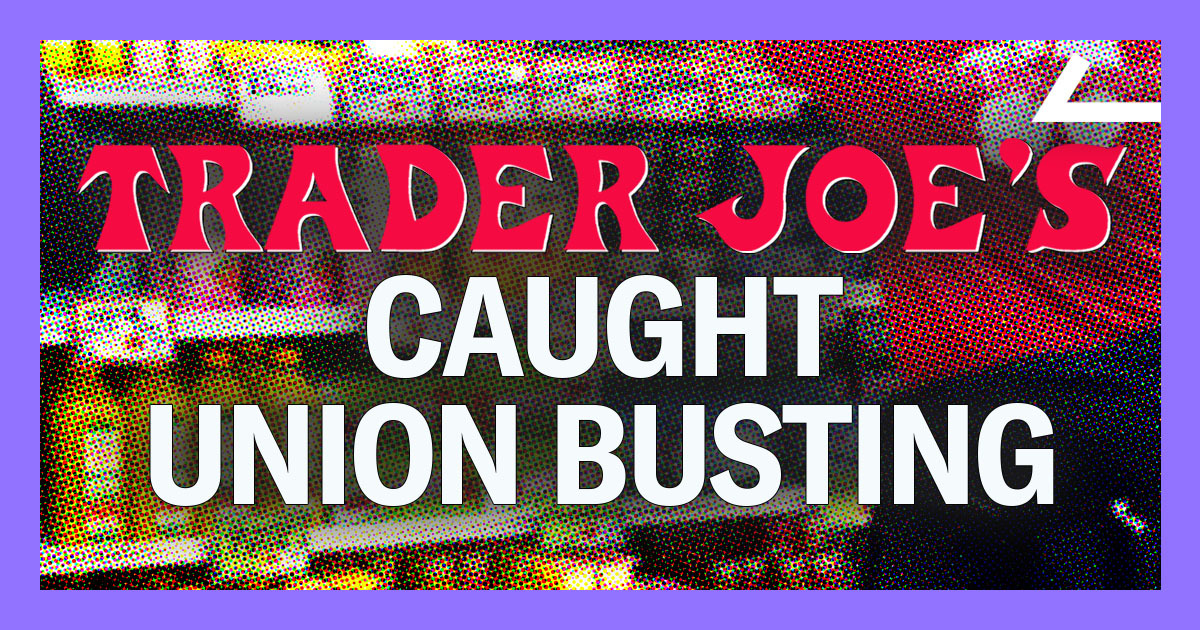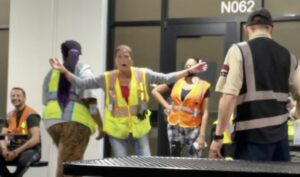Video produced and edited by Libby Rainey and Meg Herschlein
Trader Joe’s has an untold history of illegal union-busting. Understanding it is key for workers leading a new unionization wave. At a store in Vermont, managers denied raises to workers who organized for better pay & sick leave. Workers filed charges with the NLRB and won. We spoke with Trader Joe’s workers in Burlington, Vermont. Below is a full transcript of the video.
Zac Whidby: What illegal things did Trader Joe’s do to bust the union? [sigh] Umm…
Marilina Fernandez: They don’t care about their crew. It’s all bullsh*t. They have no integrity.
K: It was a wonderful place to work, and then it wasn’t.
Zac: The issues we faced started with the pandemic, basically. There was conflicting information, understaffing, rampant burnout. But we had an extra $2 and then another extra $2 “thank you pay,” which made it worth it for a while. In May, they got rid of that.
Shannon Dychton: Pretty much everyone in the store had their pay cut by about 20% over the course of a month.
Zac: There was a fund of separate [sick and vacation] time that we could use for COVID related things, but that was just taken away from us. It was as if management decided that COVID was over.
Marilina: We just got this letter telling us how well they’ve treated us throughout the last year—I can show you, I’ve made poverty levels. And I’m supposed to be grateful because they’ve cut my 401k in half, they’ve taken so many benefits away from me.
Yeah, they’re not your friendly neighborhood store that they pretend to be. My husband is dying. I had told my boss and the regional that I am thinking of stepping down because I can’t do this anymore. My husband is sick. So I finally step down [from my management position], lost my dollar, lost my raise, then I lost my health insurance. They didn’t tell me I was gonna lose my f*cking health insurance.
K: Everything with benefits and wages was a complete mess with the pandemic, but I think, socially, when people started to wake up to how awful it was and talk about it was when JJ got fired.
Zac: When JJ was fired, we weren’t really told why. JJ was very well-liked. What ended up happening as far as I know is that JJ “wowed” somebody.
Shannon: Wows are given to improve someone’s experience to celebrate something with them or to support them in some way.
K: If they haven’t tried a product that they want to try, we can wow it to them so they don’t have to pay for something to try.
Zac: They gave them a bag of almonds or something, and a manager saw that and decided that was unacceptable, so they were fired. But that’s something that everybody does multiple times a day. It was confusing and frustrating, and I think it made a lot of us realize that that could happen to us.
The union-busting campaign after we presented the petition was pretty quick.
K: Management responded to the petition by isolating people who had presented the petition. Certain managers wouldn’t talk to people anymore.
Shannon: The regional vice president spoke to most crew members who signed the petition on the phone and interrogated them on if they participated in it.
Zac: There were private conversations where I was brought out back to the loading area and questioned in a frame that was like, “Oh, if you’re not happy at Trader Joe’s, maybe you don’t belong here.”
Shannon: Most of the people who had been spoken to on the phone received write-ups, every single person who was physically in the store presenting the petition received a write-up.
There was a lot of just surveillance of people in general. There was a lot of following specific people around the store. The number of people that have been pushed out both leading up to the presentation of our petition and after has been just really sad.
Zac: There was a lot of misinformation going around, stemming from messaging from Trader Joe’s that unions were gonna—this amorphous third-party union was gonna come in and disrupt everything. There were a couple of people who in their review process did not receive a raise, citing their involvement in the petition. That’s super illegal.
K: It was so gratifying when the NLRB ruled in our favor. It was so validating to have a governmental entity say that Trader Joe’s was acting illegally, and that we were experiencing reality, despite what they were telling us.
Shannon: They’ll also have to notify everyone who’s affected by a write-up or lack of raise or bad review that their rights were violated. There are three of us who are eligible for back pay as a result of our missed raises at the last review cycle. Of the three of us I am the only one still working at the store. The fact that so many different parts of what the company did in response to our actions were illegal makes me think that this is happening elsewhere, makes me think that this is not an isolated thing just at our store, that people are not being listened to, that people are being told that they can raise a concern and then they’re told, ‘well that’s your problem.’ And I just want every single crew member at every single Trader Joe’s store to realize that this is not how it has to be.
Zac: Why am I speaking out about this now? I almost didn’t want to, and I had pretty much blocked Trader Joe’s out of my mind until the Hadley, Massachusetts store announced that they were unionizing, and that was such a huge motivation for me, because one, it validated that other people at Trader Joe’s are having the same experiences and it also confirmed that something needs to be done about, not just Trader Joe’s, but corporations in general posting record profits, and then lowering wages which is just shocking. It’s disgusting.
K: My message to the Hadley, Massachusetts store is thank you, I support you, and I’m so excited to see you win.
Videography by Billy Freeman



